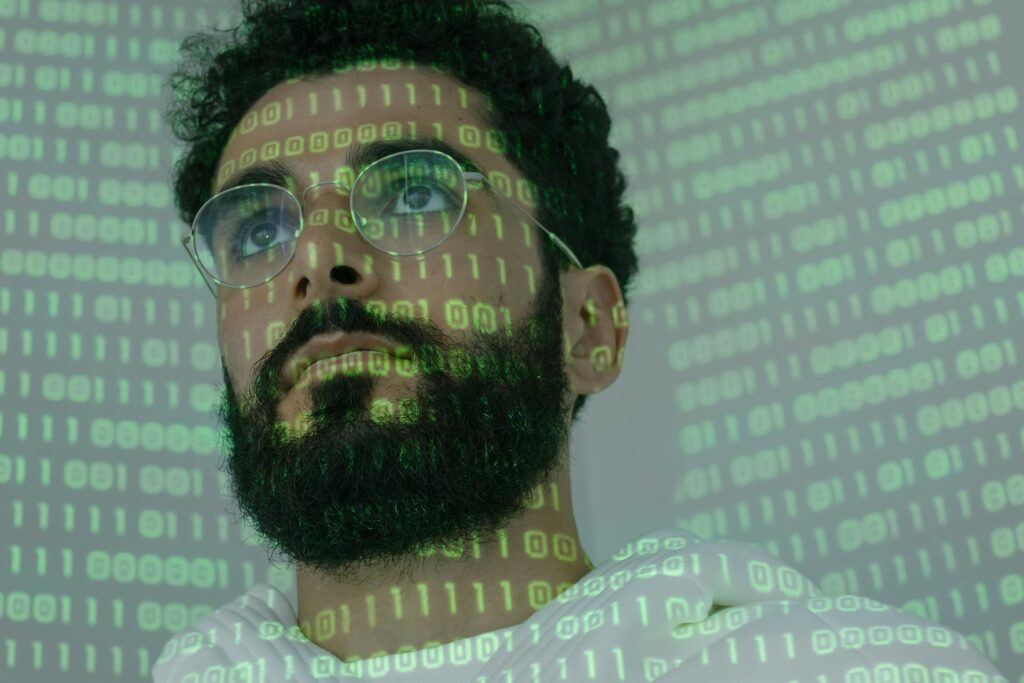By Kashif Hasan

We live in an age where the virtual dazzles with its restless promise while the real groans beneath burdens as old as time. The question of balance is not a matter of idle speculation; it is the very hinge upon which the fate of mankind now swings. To exist today is to inhabit two worlds at once: the world of flesh and spirit, and the world of code and circuit. One beats with the breath of creation; the other hums with the precision of the machine. Our tragedy is that in our intoxication with the latter we risk eroding the dignity of the former, yet in rejecting the virtual entirely we condemn ourselves to stagnation and decline. The task is not to choose but to hold both in a harmony that does not betray progress nor sacrifice our humanity.
To see the matter clearly one must begin with three instruments of the human mind: reason, logic and modern knowledge. Reason is the restless flame that distinguishes semblance from substance and demands that the given be questioned. But reason without a tool to weigh its conclusions is blind, and that tool is logic — the scales by which arguments are tested and fallacies exposed. Yet reason and logic combined are not enough unless they are grounded in knowledge, the fruit of observation, experiment and correction across time. Where these three are in balance, civilization grows. Where they fall apart, confusion spreads. This is the difference between the real and the virtual. The real world is borne forward by the balance of this trinity. The virtual is only its mechanical shadow: reason transmuted into algorithm, logic reduced to binary, knowledge turned into data sets and predictive models.
The machine can imitate our faculties with uncanny accuracy, but it cannot replicate their essence, for essence belongs to life, not its abstractions. The virtual world is man’s mathematical extension, his empire of computation. But in that empire compassion has no dwelling, conscience no voice, love no language, forgiveness no measure, sacrifice no meaning. Machines compress life into zero and one; speed is their highest law, efficiency their sole virtue. In their cold perfection the warmth of human fallibility vanishes. The real world, by contrast, is untidy, unpredictable, flawed. It contains dimensions no code can hold. In its sphere, choices are not mere calculations but acts colored by emotion, morality and spirit. A mother cradles her child not because a model predicts optimality but because love compels her. A laborer bends beneath the sun not from calculated utility but from duty, honor and hope. A mystic moves his beads in remembrance not as mechanical repetition but to attune his heartbeat with a rhythm beyond time. These are the marks of being human, and they vanish if existence is reduced to arithmetic.

The issue then is not whether to accept one world and reject the other, but how to sustain balance. The virtual grants speed and efficiency; the real grants meaning and wisdom. A machine may process millions of data points to yield an “optimal” solution, but it cannot say whether the solution is just or merciful. It may recommend the most cost-effective policy, but not whether it preserves dignity. It can calculate probabilities of success, but not the nobility of sacrifice. The human mind, though incapable of such vast calculation, can in a single moment act out of compassion and alter the destiny of another. This is a surplus no machine can replicate. The danger lies not in the rise of machines but in man’s surrender — in mistaking the mirror for the face, the shadow for the substance, in forgetting that he is more than code.
We already see both extremes. Where technology is embraced without reflection, alienation deepens. Devices promise connection yet deliver solitude. Mental distress grows, social bonds fray, the individual is reduced to a thumb scrolling endlessly through feeds without purpose. Where technology is wholly resisted, there is stagnation, marginalization, and retreat from the global stream. Both paths lead to loss. Only balance sustains. Journalism’s duty is to articulate this balance, to remind governments and citizens alike that progress without purpose is peril, and purpose without progress is impotence. Efficiency is a means, not an end. Technology is a servant, not a master. When that order is reversed, civilization itself is imperiled. A world of infinite convenience without compassion is not progress but regression in disguise — a well-polished machine that crushes the soul it was meant to serve.
The philosophical depth of the matter cannot be dismissed. The virtual is reason extended beyond its natural form, logic built into machines. But life is not mere logic. It is contradiction, paradox, mystery. To live fully is to endure imperfection, to bear the chaos of feelings, the burdens of duty, the risks of love, the certainty of death. In these imperfections lies human greatness — greatness no algorithm can reproduce. If, in the name of efficiency, civilization casts aside emotion, morality and spirit, it will dig its own grave: a grave lit by screens, perfectly ordered, utterly lifeless.
Here religion, philosophy and poetry converge on a truth no machine can fathom: that within the human breast dwells an irreducible spark. Faith calls it soul, poets call it heart, and philosophers call it essence. It cannot be digitized. It is the very seat of dignity. It binds man to his Maker, lifts him beyond survival towards meaning. If he surrenders this spark for convenience, he abandons his birthright. Across the world the struggle is visible. Governments sing hymns to “digital transformation”. Corporations measure every gesture as data. Education shifts to screens, childhood becomes mediated by devices, politics shrinks to metrics, art is valued in clicks. Yet one also finds resistance: communities insisting on human contact, families preserving rituals of warmth, writers and thinkers reminding us that meaning cannot be coded, that the story of man is not an equation, and that dignity lies in precisely that which resists mechanization.
Our task is to preserve that dignity while using machines as tools. They are not enemies but extensions. Yet extensions without essence become masters, and servants without souls become tyrants when allowed to dictate the order of life. To live rightly today is to let the virtual extend the powers of the real without replacing it, to let data inform but not decide, to let algorithms calculate but not command, to let screens assist but not absorb, and to keep the heart — fallible though it is — as the final seat of judgment. Only in that balance can man remain human, only in that proportion can civilization remain civilized.
Thus the problem returns to its first principle. The balance between the virtual and the real is not a luxury but a necessity, not an abstraction but survival itself. The virtual without the real is machinery without soul; the real without the virtual is aspiration without strength. The destiny of mankind lies not in choosing one against the other, but in sustaining a harmony that allows progress to be purposeful and purpose to be progressive. If that harmony is lost, man may possess the most advanced systems ever devised, and yet be stripped of the one thing that cannot be programmed: his humanity.























